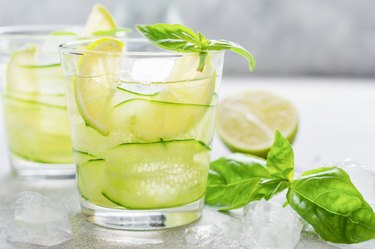
Many people consider diet soda a good alternative to sugary sodas. After all, it's free of sugar and all its calories. But diet sodas contain a variety of ingredients that may increase your blood pressure or affect your overall heart health. So — it might not be a healthy choice after all.
Video of the Day
Video of the Day
Diet Soda and Blood Pressure
Although diet soda may seem like a great option for people who want to control type 2 diabetes, are trying to lose weight, or just want to reduce their sugar intake, it's not exactly a healthy choice because it has no nutrients. Some studies have found a relationship between diet soda consumption and blood pressure levels in groups of people that might surprise you.
In fact, a February 2016 study in the Journal of Hypertension found that among fifth graders, those who drank diet soda had the highest blood pressure levels. Their blood pressure was higher on average than those who drank regular soft drinks and those who didn't drink soft drinks at all.
However, this effect could be due to the fact that those children had other medical conditions that predisposed them to high blood pressure, like obesity, and that led them or their parents to choose diet soda as a beverage option.
According to Mayo Clinic, current evidence suggests that it's not the artificial sweeteners in diet soda that could affect blood pressure, but rather other ingredients. Diet soda contains sodium, and some salt-sensitive individuals may experience blood pressure increases when they consume a diet high in sodium, according to a July 2016 statement from the American Heart Association in Hypertension.
Additionally, a small trial published in December 2018 in the Journal of Nutrition found that soda may cause water retention and bloating, particularly in women, which could potentially lead to short-term increases in blood pressure. This effect is not exclusive to diet soda however — it can also be caused by sugary sodas and other carbonated beverages.
Diet Soda and Heart Health
What should you do about that diet soda with aspartame staring back at you in the checkout aisle?
Long-term diet soda consumption — and here's where artificial sweeteners in particular come in — may affect your overall heart health, according to a research review published in July 2017 in the Canadian Medical Association Journal. This review, which included seven studies with over 1,000 participants, found that those who consumed artificial sweeteners had higher rates of obesity, high blood pressure, metabolic syndrome, type 2 diabetes and heart problems.
Though the exact role played by diet soda isn't clear, the potential link between drinking it and health issues is gathering attention.
Alternatives to Diet Soda
According to the Canadian Medical Association Journal study, diet soda doesn't appear to help even with weight loss. There are several healthier alternatives to diet soda you can try, many without any calories.
According to Christa Brown, RDN, a registered dietitian nutritionist in private practice in New York City, flavored fizzy water is a great alternative. You can make it yourself by combining 1/2 cup seltzer water with 1 cup orange juice and a handful of ice cubes. "You're getting more bang for your buck," she says. "The potassium in the oranges will help to reduce blood pressure, if that's a concern."
Of course, there's no better option than plain water. You can jazz it up by flavoring it with fresh fruit like lemon or lime or even cucumber slices, the Centers for Disease Control and Prevention suggests.
Here are some other diet soda alternatives to try:
- Calcium-rich milk.
- Iced or hot green tea is an option that may even provide some blood pressure lowering benefits, according to a study published in February 2017 in the Journal of the American College of Nutrition.
- 100 percent fruit juices do offer nutrients, although you shouldn't overdo them because of the sugar content and lack of fiber.
Read more: 6 Teas to Stock Up On and Their Health Benefits
- Canadian Medical Association Journal: “Nonnutritive Sweeteners and Cardiometabolic Health: A Systematic Review and Meta-Analysis of Randomized Controlled Trials and Prospective Cohort Studies”
- Christa Brown, RDN, registered dietitian nutritionist, New York City
- Hypertension: “Salt Sensitivity of Blood Pressure: A Scientific Statement From the American Heart Association”
- Journal of Hypertension: “Soft Drink Consumption, Mainly Diet Ones, Is Associated With Increased Blood Pressure in Adolescents”
- Journal of Nutrition: “Men and Women Differ in Gastric Fluid Retention and Neural Activation After Consumption of Carbonated Beverages”
- Journal of the American College of Nutrition: “Short-Term Effects of Green Tea on Blood Pressure, Endothelial Function, and Metabolic Profile in Obese Prehypertensive Women: A Crossover Randomized Clinical Trial”
- Mayo Clinic: “Mayo Clinic Q and A: Diet Soda and High Blood Pressure”
- Centers for Disease Control and Prevention: “Rethink Your Drink”
Is this an emergency? If you are experiencing serious medical symptoms, please see the National Library of Medicine’s list of signs you need emergency medical attention or call 911.